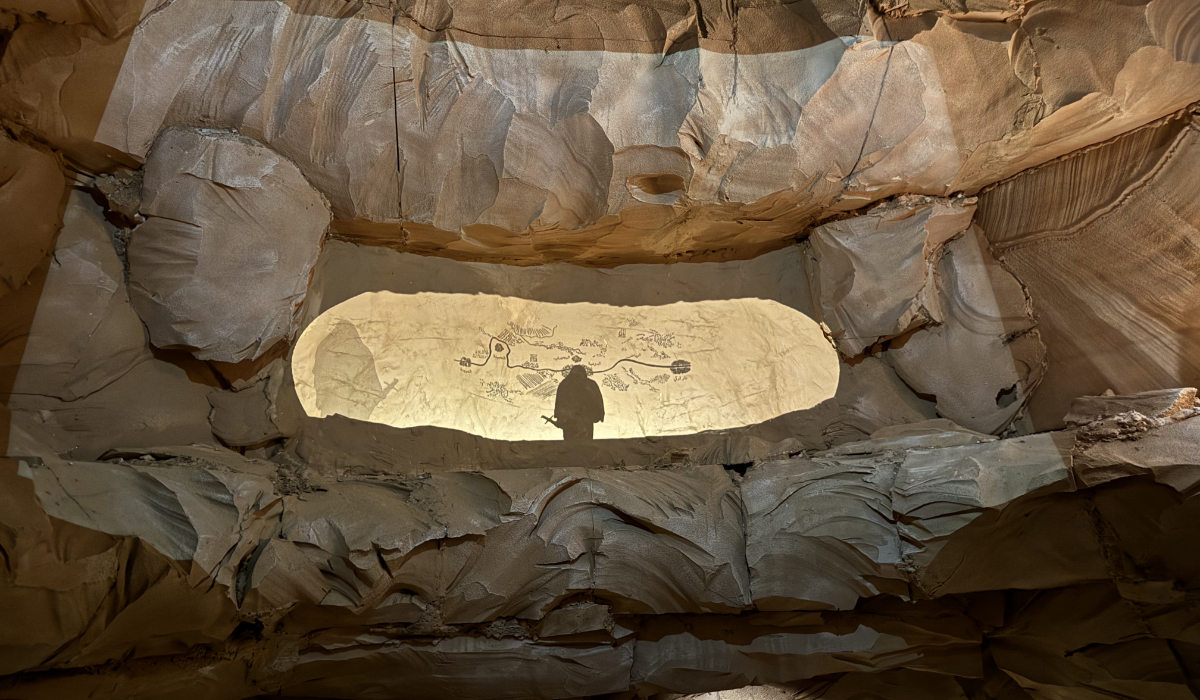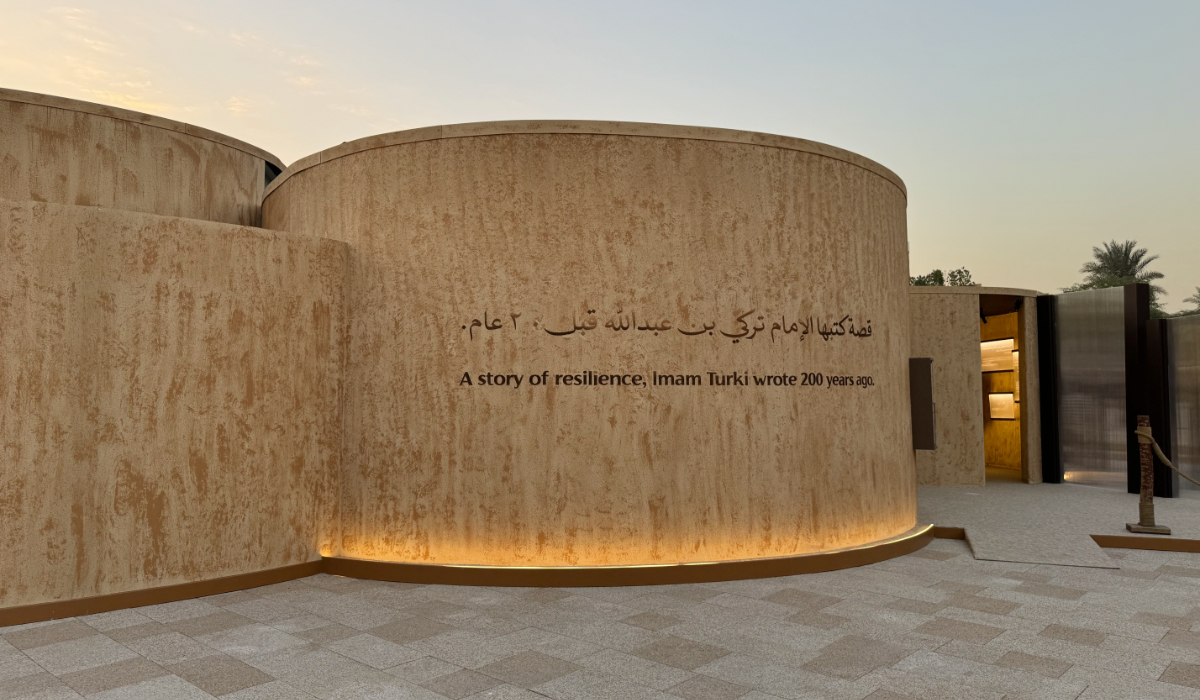RIYADH: Ali, 29, and Nizar, 31 — the Saudi DJs behind Tarab Electro and music collective Aadi — are making their mark on the local music scene, with their diverse backgrounds outside of DJing shaping their unique perspectives and experiences in the industry.
Ali told Arab News: “Our aim is to actively foster the development of the burgeoning music scene in the Kingdom. Our ultimate goal is centered on putting Riyadh, the vibrant capital of Saudi Arabia, firmly on the map as an essential destination for music enthusiasts and creators alike.”
Inspired by the power of music to transcend linguistic and cultural barriers, they sought to create an inclusive space where diverse communities could harmoniously coexist and embrace one another’s rich tapestry of traditions and experiences.

The first MDLBEASt festival in 2019 in the Kingdom made Saudi DJs Ali and Nizar believe they could practice their passion locally. (Instagram/ tarabelectro)
“We co-founded Aadi, a collective that showcases and celebrates local, regional, and international talent through music and art events,” said Ali.
Through Aadi, they have had the opportunity to invite artists from abroad and build cultural bridges through music.
The platform allows creative communities to express themselves and establish connections, Nizar said, highlighting that one of Aadi’s core principles involves fostering meaningful bonds with music communities that resonate with their shared passion and values, not only within the local region but also on a global scale.
HIGHLIGHTS
• Ali and Nizar are the Saudi DJs behind Tarab Electro and Aadi Music and Arts Collective.
• The collective showcases and celebrates local, regional, and international talent through music and art events.
• In September, the DJs are booked to play at the Turin Egyptian Museum for an event called Silencio.
“Through Aadi, we invited talented artists from numerous countries, such as France, Bahrain, Kuwait, Jordan, Morocco, and the Philippines, to be part of our events,” he said.

The first MDLBEASt festival in 2019 in the Kingdom made Saudi DJs Ali and Nizar believe they could practice their passion locally. (Instagram/ tarabelectro)
In doing so, Aadi has successfully brought these exceptional artists to Saudi Arabia for the first time, introducing their unique talents and perspectives to the local audience.
“Last February, we booked three super-talented artists from French music collectives and labels,” Nizar explained.
With every note played and every lyric sung, their love for bridging cultures not only widened the horizons of those fortunate enough to listen but also left an indelible mark on the international music scene, forever altering how artists investigate and celebrate the vibrant tapestry of humanity.
There is so much acceptance and support now, and the number of fellow DJs and creatives, in general, is massive. It’s so good to work with some of these talents. We all inspire each other and must rise together.
Ali, Tarab Electro DJ
With Tarab Electro, the pair hopes to showcase their passion for music, while simultaneously establishing meaningful connections with diverse music communities spanning the entire globe.
When it comes to their own musical style, the self-taught duo primarily focuses on house and electronic music. However, as seasoned music lovers, they incorporate various genres and sounds that have influenced them.

The first MDLBEASt festival in 2019 in the Kingdom made Saudi DJs Ali and Nizar believe they could practice their passion locally. (Instagram/ tarabelectro)
Their sets can include classic house records, Brazilian funk from the 70s and 80s, and even unexpected combinations like Talal Maddah and Britney Spears in the same set.
They have played in several clubs and events around Paris and Europe in general.
“There is one venue in Paris we mainly performed at called Spootnik, which is an iconic music-lovers place and an institution where some of the biggest names in the underground scene play.
“Between 2021 to 2023, we played in Washington D.C., Malaga, Zurich, Ibiza, Amsterdam, Paris, and the south of France in a 12th-century medieval castle,” said Ali.
Ali and Nizar have also been privileged to perform locally in Riyadh, Jeddah, and Jizan.
“In Jizan, we were invited to perform 2,000 meters above ground on a mountain called Jabal Al-Qahar. It was part of a campaign by MDLBEAST and the Ministry of Culture to celebrate the Year of Arabic Calligraphy and to showcase the breadth of beautiful locations we have in the country,” added Nizar. Their video of the event has garnered tens of thousands of views.
In September, the DJs are booked to play at the Turin Egyptian Museum, established in 1824 in Turin, Italy, for an event called Silencio.
Nizar is based in Riyadh, and Ali recently moved back from Paris to the Kingdom to focus on contributing to the growth of the musical ecosystem in Saudi Arabia.
They have been into electronic music for a decade and a half, attending shows worldwide. However, the turning point in their creative journey was the first MDLBEAST festival in 2019 in the Kingdom, which made them believe they could practice their passion locally.
“There is so much acceptance and support now, and the number of fellow DJs and creatives, in general, is massive. It’s so good to work with some of these talents. We all inspire each other and must rise together,” Ali added.
The duo first started DJing merely as a passion, led by an unwavering commitment to uniting people from various backgrounds through music.
Ali brings a wealth of knowledge and expertise from his two-year job at UNESCO in Paris, where he worked in the culture sector. He advised member states on cultural policies and advocated for the role of cultural and creative industries in sustainable development.
Prior to that, Ali worked as a communications consultant in large-scale sports and entertainment events in Saudi Arabia, including some of the first concerts and significant sports spectacles.
Nizar is a technologist with experience working in Europe and the Middle East. He has worked for various tech companies as a technology consultant for digital transformation, cloud, data, and artificial intelligence projects.
“I am an active emerging-tech evangelist in the startup community,” Nizar added.
Ali and Nizar said that gaining recognition in the industry has been a gradual and organic process. “When we first started, it was tough to lock down gigs because we did not have a name for ourselves yet. Then COVID hit, which made it impossible to play anywhere,” said Ali.
Nizar told Arab News that they used that time to be featured on some online radio programs and podcasts, and then the calls started to come. “Once COVID regulations and precautions relaxed, we played in Washington D.C., and then I would say that our first Soundstorm appearance in 2021 got things rolling.”
The challenges they initially faced included the need for more opportunities to play in Saudi Arabia before 2019 and the broader lack of acceptance for music in the country.
“However, we witnessed a significant shift in the music scene in Saudi Arabia over the past few years, with more acceptance, support, and infrastructure being built,” Ali added.
The duo believes the future is bright for anyone in today’s Saudi music scene.
To aspiring DJs in the Kingdom, Ali and Nizar advise being true to themselves. They emphasize the importance of playing what they love and being humble, as success will naturally follow from there.
“Start small, don’t inundate yourself with equipment beyond your current level, because you will become overwhelmed and burn yourself out,” Nizar said.
As they continue to gain recognition locally and internationally, they strive to contribute to the growth of the burgeoning music scene in Saudi Arabia and put Riyadh on the map.
To explore their work, visit @tarabelectro on Instagram.



































